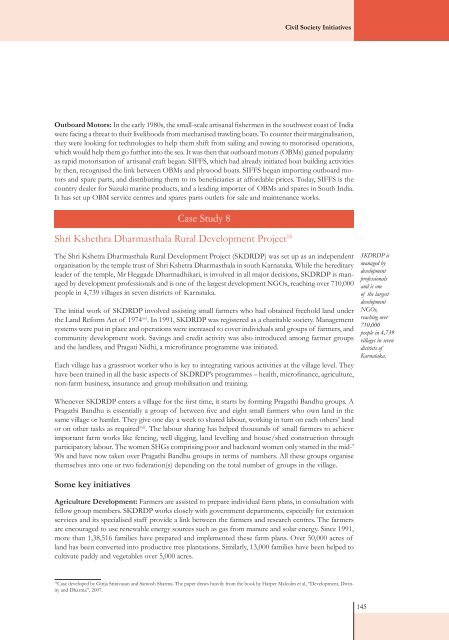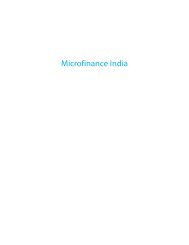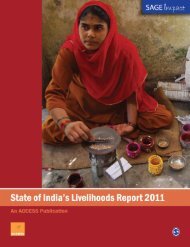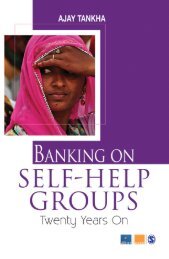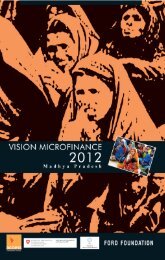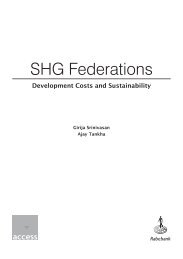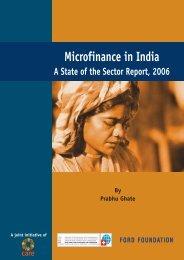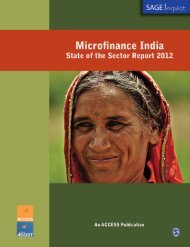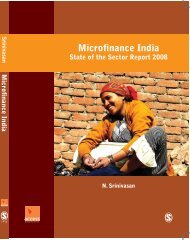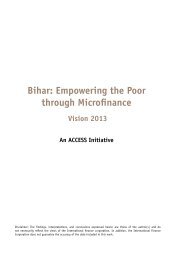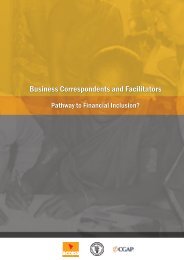Chapter VIvarious district federations. Apart from these male fisher folk members, about 3,636 women members,through the affiliated women’s federations, are linked to the SIFFS network.The key lessonfrom SIFFSis that oneshould not usetraditionalmicrofinanceapproaches forlivelihood financingincludingfisheries.SIFFS as an apex body has commercial and non-commercial functions. It has three core business areas- fish marketing, technology intervention and credit delivery/facilitation. The non-commercial functionsinclude research and development for appropriate technology for fishermen, information dissemination,advocacy and collective action and training. SIFFS is a sectoral intervention using a ‘commodity cooperative’model where the main target group is seagoing fishermen who are normally exploited by middlemenand moneylenders who control the beach-level fish sales. To counter this exploitation, the village levelsociety model was developed in the early 1970s, based on the concept of fishermen having their ownmarketing arrangements and linking it with a savings and credit system. The SIFFS society model is arelatively rare one where marketing, credit and savings are integrated into one single system at the villagelevel. xiii The key lesson from SIFFS is that one should not use traditional microfinance approaches forlivelihood financing including fisheries 15 xiv since the minimalist approach of finance/credit alone will notwork. An integrated approach using financial and non-financial services is what will work.Some key initiatives:• All fish caught by members is sold through the village society• The society sells fish through a beach-level auction and when necessary, by direct sale to wholesalersand export companies• All fish sales income of a fisherman flows through the society• Source deductions for compulsory savings (often 2-3 per cent of sales income), loan repaymentsand other contributions• Compulsory savings and loan repayment, made from a percentage of the sales income rather thanfixed instalments• Society overheads covered through a small commission on fish sales (2-3 per cent) and the surplusused to build up capital fund and/or to provide a ‘bonus’ to membersSavings can generally be withdrawn (on the basis of locally determined rules) for various consumptionneeds and emergencies. It is also the source of liquidity for the society that allows it to pay the fishprice to members on the same day even though the buyers may take time to pay up. Fish is mostly soldon credit for periods ranging from one day in the case of locally consumed varieties up to a week forfish going to distant markets and exports. Thus the savings as well as the capital of a village society isonly nominally used as a source of credit for members. This means that most of the credit needed forreplacement of fishing equipment has to come from external sources. This is achieved by linking thesociety to a local branch of a commercial bank. Such credit is given to the individual by the bank, on thebasis of a guarantee by the society. The society then recovers the money through its source deductionsystem (normally 10 per cent of fish sales income), accumulates the loan repayments and remits to thebank on a monthly basis. xvBoat Building: SIFFS pioneered the introduction of marine plywood boats in 1982. Since then, it hasbeen playing a major role in the promotion of marine plywood boats in three districts on the southwestcoast of South India. The three districts of Trivandrum, Quilon and Kanyakumari were characterised byrough surf conditions and the availability of a large number of fish species in small quantities, resultingin conditions that favoured small-scale diversified fishing operations. The kattumaram, a fishing craft,has been the mainstay of the small-scale fishermen in these districts for centuries. Due to increasingdeforestation in early 1980s, timber for kattumaram was becoming scarce, and a need was felt for analternative. The plywood boat project was the result of the efforts in this direction. Today, SIFFS is aleading player and price leader in the plywood boat building market in the southwest coast of India.144
Civil Society InitiativesOutboard Motors: In the early 1980s, the small-scale artisanal fishermen in the southwest coast of Indiawere facing a threat to their livelihoods from mechanised trawling boats. To counter their marginalisation,they were looking for technologies to help them shift from sailing and rowing to motorised operations,which would help them go further into the sea. It was then that outboard motors (OBMs) gained popularityas rapid motorisation of artisanal craft began. SIFFS, which had already initiated boat building activitiesby then, recognised the link between OBMs and plywood boats. SIFFS began importing outboard motorsand spare parts, and distributing them to its beneficiaries at affordable prices. Today, SIFFS is thecountry dealer for Suzuki marine products, and a leading importer of OBMs and spares in South India.It has set up OBM service centres and spares parts outlets for sale and maintenance works.Case Study 8Shri Kshethra Dharmasthala Rural <strong>Development</strong> Project 16The Shri Kshetra Dharmasthala Rural <strong>Development</strong> Project (SKDRDP) was set up as an independentorganisation by the temple trust of Shri Kshetra Dharmasthala in south Karnataka. While the hereditaryleader of the temple, Mr Heggade Dharmadhikari, is involved in all major decisions, SKDRDP is managedby development professionals and is one of the largest development NGOs, reaching over 710,000people in 4,739 villages in seven districts of Karnataka.The initial work of SKDRDP involved assisting small farmers who had obtained freehold land underthe Land Reform Act of 1974 xvi . In 1991, SKDRDP was registered as a charitable society. Managementsystems were put in place and operations were increased to cover individuals and groups of farmers, andcommunity development work. Savings and credit activity was also introduced among farmer groupsand the landless, and Pragati Nidhi, a microfinance programme was initiated.Each village has a grassroot worker who is key to integrating various activities at the village level. Theyhave been trained in all the basic aspects of SKDRDP’s programmes – health, microfinance, agriculture,non-farm business, insurance and group mobilisation and training.SKDRDP ismanaged bydevelopmentprofessionalsand is oneof the largestdevelopmentNGOs,reaching over710,000people in 4,739villages in sevendistricts ofKarnataka.Whenever SKDRDP enters a village for the first time, it starts by forming Pragathi Bandhu groups. APragathi Bandhu is essentially a group of between five and eight small farmers who own land in thesame village or hamlet. They give one day a week to shared labour, working in turn on each others’ landor on other tasks as required xvii . The labour sharing has helped thousands of small farmers to achieveimportant farm works like fencing, well digging, land levelling and house/shed construction throughparticipatory labour. The women SHGs comprising poor and backward women only started in the mid-’90s and have now taken over Pragathi Bandhu groups in terms of numbers. All these groups organisethemselves into one or two federation(s) depending on the total number of groups in the village.Some key initiativesAgriculture <strong>Development</strong>: Farmers are assisted to prepare individual farm plans, in consultation withfellow group members. SKDRDP works closely with government departments, especially for extensionservices and its specialised staff provide a link between the farmers and research centres. The farmersare encouraged to use renewable energy sources such as gas from manure and solar energy. Since 1991,more than 1,38,516 families have prepared and implemented these farm plans. Over 50,000 acres ofland has been converted into productive tree plantations. Similarly, 13,000 families have been helped tocultivate paddy and vegetables over 5,000 acres.16Case developed by Girija Srinivasan and Santosh Sharma. The paper draws heavily from the book by Harper Malcolm et al, “<strong>Development</strong>, Divinityand Dharma”, 2007.145
- Page 3 and 4:
State of India’s Livelihoods :The
- Page 5 and 6:
ChapterPage NoForeword 6Preface 8Ab
- Page 8:
ForewordAs a part of its microfinan
- Page 11 and 12:
employment growth, these sectors we
- Page 14:
RIAARMKRRBRSVYSCSC/STsSCPSCSPSERPSE
- Page 20 and 21:
Chapter Iresponse, risks and shocks
- Page 23 and 24:
OverviewTable 1.2 Employment and Un
- Page 25 and 26:
OverviewA recent paper by Arjun Sen
- Page 27:
Overview4. How is the livelihood st
- Page 31 and 32:
Overview5.2 Manmade constraints - i
- Page 33 and 34:
Overviewthe late 1980s, these two m
- Page 35 and 36:
OverviewIn the 1970s, the Chipko mo
- Page 37 and 38:
Overviewsocial responsibility (CSR)
- Page 39 and 40:
OverviewBox 1.3 Bihar - Underdevelo
- Page 42 and 43:
4040
- Page 44 and 45:
Chapter IIAn enumeration of the dep
- Page 46 and 47:
Chapter IIBox 2.1 Macro Level Livel
- Page 48 and 49:
Chapter IIIn addition to the above,
- Page 50 and 51:
Chapter IIFig 2.1: Poverty Ratio am
- Page 52 and 53:
Chapter IIPoormigrantlabouroften su
- Page 54 and 55:
Chapter IIInterestingly, the Govern
- Page 56 and 57:
Chapter IIThe effective cost of nat
- Page 58 and 59:
Chapter IIsector and thereby casual
- Page 60 and 61:
Chapter IIReferences1. Aiyar , Swam
- Page 62 and 63:
Chapter IIIto, the vulnerability co
- Page 64 and 65:
Chapter IIIIt would be useful here
- Page 66 and 67:
Chapter IIIof new employment opport
- Page 68 and 69:
Chapter IIIinterest subvention - wo
- Page 70 and 71:
Chapter III6. The 11th Plan propose
- Page 72 and 73:
Chapter IIIBox 3.5: Rural Business
- Page 74 and 75:
Chapter III9. The achievement of ge
- Page 76 and 77:
Chapter IIIaid. The Plan also seeks
- Page 78 and 79:
Chapter IIIand health. They point o
- Page 80 and 81:
Chapter IIIReferences1. Ambasta, Pr
- Page 82 and 83:
8080
- Page 84 and 85:
Chapter IVtransport, storage, commu
- Page 86 and 87:
Chapter IVing of ‘English Speakin
- Page 88 and 89:
Chapter IVWhile these livelihoods h
- Page 90 and 91:
Chapter IVTable 4.6 Employment with
- Page 92 and 93:
Chapter IVConstruction requires no
- Page 94 and 95:
Chapter IVgains in manufacturing ha
- Page 96 and 97: Chapter IV10. A Spatial Perspective
- Page 98 and 99: Chapter IVA quick glance at some of
- Page 100 and 101: Chapter IV12. Once a watershed is d
- Page 102: Chapter IVThrougha range ofschemes
- Page 105 and 106: Public Systems: Major central gover
- Page 107 and 108: Public Systems: Major central gover
- Page 109 and 110: Public Systems: Major central gover
- Page 111 and 112: Public Systems: Major central gover
- Page 113 and 114: Public Systems: Major central gover
- Page 115 and 116: Public Systems: Major central gover
- Page 117 and 118: Public Systems: Major central gover
- Page 119 and 120: Public Systems: Major central gover
- Page 121 and 122: Public Systems: Major central gover
- Page 123 and 124: Public Systems: Major central gover
- Page 125 and 126: Public Systems: Major central gover
- Page 127 and 128: Public Systems: Major central gover
- Page 129 and 130: Public Systems: Major central gover
- Page 131 and 132: Public Systems: Major central gover
- Page 133 and 134: Civil Society InitiativesChapter VI
- Page 135 and 136: Civil Society InitiativesThe human
- Page 137 and 138: Civil Society Initiativesso far has
- Page 139 and 140: Civil Society Initiativesan 8 per c
- Page 141 and 142: Civil Society InitiativesThe cooper
- Page 143 and 144: Civil Society Initiativeslimited ir
- Page 145: Civil Society Initiativesintelligen
- Page 149 and 150: Civil Society InitiativesCase Study
- Page 151 and 152: Civil Society InitiativesReferences
- Page 153 and 154: The Contribution of Corporate Suppl
- Page 155 and 156: The Contribution of Corporate Suppl
- Page 157 and 158: The Contribution of Corporate Suppl
- Page 159 and 160: The Contribution of Corporate Suppl
- Page 161 and 162: The Contribution of Corporate Suppl
- Page 163 and 164: The Contribution of Corporate Suppl
- Page 165 and 166: The Contribution of Corporate Suppl
- Page 167 and 168: The Contribution of Corporate Suppl
- Page 169 and 170: The Contribution of Corporate Suppl
- Page 172 and 173: Chapter VIII170
- Page 174 and 175: Chapter VIIIcountry that make the e
- Page 176 and 177: Chapter VIIIFig 8.4: All-India area
- Page 178 and 179: Chapter VIIIWhen commercial crops l
- Page 180 and 181: Chapter VIIIunit of risk settlement
- Page 182 and 183: Chapter VIIIPublic capitalformation
- Page 184 and 185: Chapter VIII8. Integrated Rural Dev
- Page 186 and 187: Chapter VIIIAn expertpanel ‘sreco
- Page 188 and 189: Chapter VIIIHowever as final wage s
- Page 190: 188
- Page 193 and 194: appENDIX TableTable A.1.3: Distribu
- Page 195 and 196: appENDIX TableEmploymentEmploymentG
- Page 197 and 198:
appENDIX TableTable 2: Employment S
- Page 199 and 200:
appENDIX TableTable 4: State Wise G
- Page 201 and 202:
appENDIX TableTable-7: Distribution
- Page 203 and 204:
appENDIX TableDams and Displacement
- Page 205 and 206:
appENDIX TableFig. A.3.2: High Pote
- Page 207 and 208:
appENDIX TableTable A.3.2Table 2: S
- Page 209 and 210:
appENDIX TableChapter IV - ANNEX TA
- Page 211 and 212:
appENDIX TableAnnex A.5.1Backward R
- Page 213 and 214:
appENDIX TableAnnex A.5.3Some UNDP
- Page 215 and 216:
appENDIX TableGross Value of Output
- Page 217 and 218:
Mona DikshitMona Dikshit has been a


